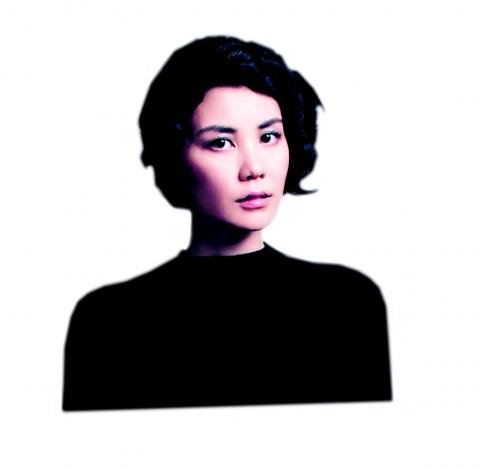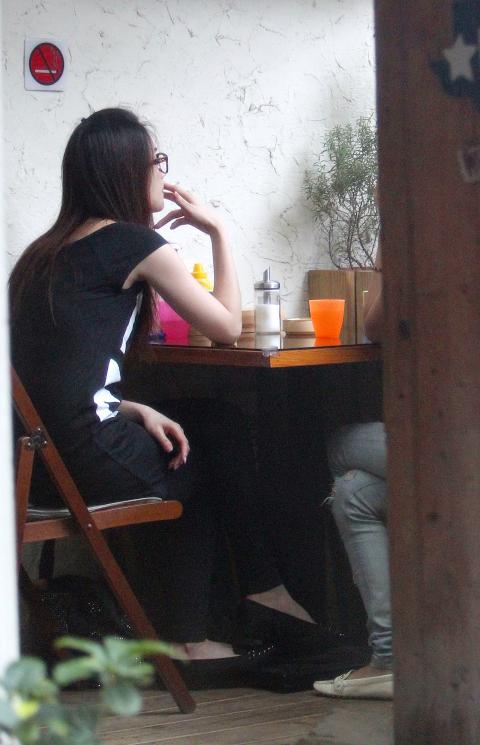Zhang Ziyi (章子怡) is threatening to sue the Apple Daily (蘋果日報) after the newspaper published reports that the Chinese actress had taken money in exchange for sexual encounters with disgraced politician Bo Xilai (薄熙來) and other high profile men.
After the rumors broke, Zhang quickly took steps to protect her reputation, including issuing a denial and flying to Hong Kong to meet with a lawyer. Zhang also put in an appearance at the Chinese Film Media Awards (華語電影傳媒大獎), appearing unperturbed as she smiled and posed for photographs on the red carpet. Though she refused to answer questions from reporters, Zhang told the press that she was happy to be at the ceremony.
But the Crouching Tiger, Hidden Dragon (臥虎藏龍) star did not mince words on her microblog. “I’m not fighting this alone,” Zhang wrote, adding that she had discussed her legal options with her lawyer, who has already sent out letters to the Hong Kong media outlets that first published reports about Zhang’s alleged paid dalliances.

Photo: Taipei Times
Disgraced Taiwanese-Japanese actress Makiyo is also doing damage control to her reputation after pleading guilty to assaulting a taxi driver. Makiyo and her friend Hsiang Ying (湘瑩), who was also at the scene of the February incident and later pleaded guilty to perjury, were recently spotted selling cookies at a charity event. The friends managed to raise NT$4,000 for physically disabled children.
Though she has been unemployed since having her work permit revoked, Makiyo told reporters that she hasn’t been idle. In addition to abstaining from alcohol and pursuing volunteer opportunities, Makiyo has taken up yoga and horse riding lessons.
Like her friend, Hsiang Ying has been unable to work and now lives off her savings. The actress is occupying herself with yoga, speech training classes and helping her mother sell fried chicken.

Photo: Taipei Times
Makiyo says she hopes to return to show business one day, but is keeping a pragmatic attitude.
“I’ve worked in the industry for 14 years, so it’s just another form of work to me,” she said. “If I can’t go back, it’s fine. I don’t want to keep depending on the entertainment business.”
Despite their charity work, Makiyo and Hsiang Yang still have a long way to go before they return to the good graces of the media. A Liberty Times reporter noted the irony of the two friends taking a taxi after the charity event. The driver dropped them off at a cafe where Hsiang Yang puffed away on a cigarette under a “no smoking” sign. The cafe’s owner later told the reporter that she granted Hsiang Yang permission to smoke because she was outside.
Afterward, the same taxi arrived to take the two women to their next destination. The Liberty Times wondered if Makiyo now has a personal driver because other cabbies are wary of her patronage. Makiyo’s manager insisted that while his client always calls the same company, she usually takes different taxis.
Faye Wong’s (王菲) daughter has also been living in seclusion. The teenager is not in trouble with the law, but with her parents, who are fed up with the girl’s rebelliousness. According to media reports, Dou Jingtong (竇靖童), Wong’s daughter with her first husband Dou Wei (竇唯), has turned into a back-talking party girl.
After repeatedly clashing with stepfather Li Yapeng (李亞鵬), Dou Jingtong was shipped off to a Shanghai boarding school. After the 15-year-old managed to sneak off to a nightclub with a male classmate, her angry mother ordered her home to Beijing. Dou Jingtong is now under strict supervision when not in class.
She may not be allowed out of the house, but Dou Jingtong found yet another way to rebel last week. Like many teenagers, she took to her blog to complain. “Life is just so limited wen [sic] ur [sic] young,” Dou Jingtong wrote in English. “You can never make your own decisions of where you want to live, what you want to do.”

The primaries for this year’s nine-in-one local elections in November began early in this election cycle, starting last autumn. The local press has been full of tales of intrigue, betrayal, infighting and drama going back to the summer of 2024. This is not widely covered in the English-language press, and the nine-in-one elections are not well understood. The nine-in-one elections refer to the nine levels of local governments that go to the ballot, from the neighborhood and village borough chief level on up to the city mayor and county commissioner level. The main focus is on the 22 special municipality

The People’s Republic of China (PRC) invaded Vietnam in 1979, following a year of increasingly tense relations between the two states. Beijing viewed Vietnam’s close relations with Soviet Russia as a threat. One of the pretexts it used was the alleged mistreatment of the ethnic Chinese in Vietnam. Tension between the ethnic Chinese and governments in Vietnam had been ongoing for decades. The French used to play off the Vietnamese against the Chinese as a divide-and-rule strategy. The Saigon government in 1956 compelled all Vietnam-born Chinese to adopt Vietnamese citizenship. It also banned them from 11 trades they had previously

In the 2010s, the Communist Party of China (CCP) began cracking down on Christian churches. Media reports said at the time that various versions of Protestant Christianity were likely the fastest growing religions in the People’s Republic of China (PRC). The crackdown was part of a campaign that in turn was part of a larger movement to bring religion under party control. For the Protestant churches, “the government’s aim has been to force all churches into the state-controlled organization,” according to a 2023 article in Christianity Today. That piece was centered on Wang Yi (王怡), the fiery, charismatic pastor of the

Hsu Pu-liao (許不了) never lived to see the premiere of his most successful film, The Clown and the Swan (小丑與天鵝, 1985). The movie, which starred Hsu, the “Taiwanese Charlie Chaplin,” outgrossed Jackie Chan’s Heart of Dragon (龍的心), earning NT$9.2 million at the local box office. Forty years after its premiere, the film has become the Taiwan Film and Audiovisual Institute’s (TFAI) 100th restoration. “It is the only one of Hsu’s films whose original negative survived,” says director Kevin Chu (朱延平), one of Taiwan’s most commercially successful